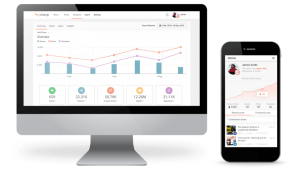The Shifting Role of the Employee Expert in Communications

Article by Roope Heinilä, CEO, Smarp
Thought leadership, personal branding, knowledge sharing, employee engagement, employee advocacy… sound familiar? These are some of the leading trends today that come up in almost every conversation with communications, marketing and HR leaders. They are not just words but a driving force reshaping the way organizations think about their brands as they place the focus on individual employees and their collective ability to shape the brand.
This undeniable trend is a symptom of the knowledge-based economy that we live in today. We no longer hire people based on a single skill but instead on their ability to constantly gather and utilize knowledge while also being able to develop quickly in an ever-changing environment.
The Way We Consume Information Has Changed
The possibility to obtain information in real time by using digital tools and social networks has made information almost impossible to hide. At the core of the change is the way we consume information, which has changed radically in the last 20 years. And the pace of change is only accelerating. We have moved from relying on the media and a small group of acquaintances for our information to being able to impact hundreds, if not thousands of others with the simple act of sharing an opinion online.
20 years ago if you went on a trip, you likely read professional reviews on newspapers and magazines and asked friends for their recommendations. Today, you see photos from your friends’ trips on Facebook, are able to ask for suggestions with a simple post, and can go to Tripadvisor to access experiences of other travelers like yourself. The same applies to just about anything we choose to do or purchase, whether it’s a car, phone, laptop or movie tickets. We are all connectors of information and rely on each other to help us to cut through the clutter and provide the most valuable parts in byte-sized pieces.
Human-to-Human Communication
While this trend has existed on the consumer side for over a decade, it is now slowly making its way into B2B as well. The saying that there is no more B2B or B2C, just H2H (Human-to-Human), is becoming more relevant every day, as we move our trust from a select few sources we know, such as mass media, towards peers with a name and a face. Potential customers, job applicants and partners are now basing their decisions on the opinions of their peers.
This creates both an opportunity and a challenge for companies. How do companies gain more Share of Voice in this new environment where everyone has the potential to become an influencer? The most powerful resource is the company’s own group of employees, as they have a vested interest in the success of the brand.
The next question then becomes, how do you make sure all employees are always well informed while also empowering them to build their personal brands as they support the company’s vision?
Keeping Employees Well Informed
The first step is simple: provide a way for them to consume content in a manner they are already familiar with as consumers. Employees today expect to be kept up to date on the latest information, processes, and company news. At the same time, the tools to do so are lagging behind. Current solutions make it difficult to obtain relevant information and they require the user to know exactly what to look for. Employees are faced with either an information overload or information silos and are not able to keep up to date with the knowledge they need in order to be successful.
Companies are now struggling to reduce these information bottlenecks and have acknowledged that information sharing among employees is more beneficial than creating silos. The solution to this is that instead of trying to direct employee behavior in gathering information, companies should bring consumer behavior, i.e. the consumption of information on mobile apps, to the workplace.
Empower, Don’t Limit
In this new knowledge-based economy, companies need to empower their employees instead of creating limits for them. The scariest part for them seems to be that they need to give up control of information and instead focus on creating an authentic experience for both employees and external stakeholders.
Having an effective communication program for employees leads to increased productivity and provides an opportunity for employees to become brand ambassadors for the company. These employees will become the company’s most powerful communication assets by broadcasting their message to their networks and acting as trusted information sources to outsiders. From an employee’s perspective, the opportunity to represent the brand and tell about their own work helps them build their personal brands and position themselves as experts in their fields. This is a win-win scenario for companies willing to embrace the expert employee.





